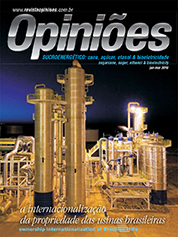Martinho da Mota Silveira Neto
Director of Sugar and Bioenergy of Bunge
Op-AA-23
International companies in the sugar and ethanol industry
The sugar and ethanol industry was the first to develop on a grand scale in the country, still in colonial days, beginning in the Northeastern states, where sugarcane transplanted from India found a favorable environment. In the past century, growth in production in the Center-South, on leveled terrain, with rich soil, made São Paulo the leading state in the industry, but with this culture present in almost all states of the country.
Brazil became the world leader in the supply of sugar, complementing the production with ethanol destined to the local industry. Given that it is an old agroindustry segment, expansion occurred through the constitution of family businesses, most of which controlled only one processing mill that produced raw sugar, with the supply of the end product for domestic consumption being done under few brand names.
The need for a more encompassing organization to access the world market resulted in the creation of collective entities, such as Copersucar, Cristalserv and others that assumed this task. The expansion of the ethanol production process, beginning with the Proálcool Program and, more recently, environmental concerns, is bringing about large growth in the industry, with the starting of the consolidation process and the formation of larger groups, combining several mills.
The launch of “flex cars” and the support of the Lula government for use of renewable fuel, seeking to make ethanol an international commodity, attracted the interest of large Brazilian and multinational groups to the industry. This trend was reinforced by factors such as market oscillations, the need for broader commercialization structures, financial and technological support, which are resulting in a significant re-structuring of the industry, increasing its international competitiveness in the commercialization of sugar and ethanol, and warranting the supply to the domestic market.
Thus, a consolidation process is in progress, forming some heavyweight groups, of which some are mostly controlled by Brazilian capital and others by international capital, particularly companies with large experience in agricultural commodities. Bunge, which for 105 years has been present in Brazil and leads exports of the country’s agricultural products, is one of the organizations that has been taking big steps in becoming one of the main players in the sugar and ethanol industry.
The experience of a company that originated in 1818, trading commodities internationally, and that has trading and distribution structures in place in the world’s main markets, is an important safety factor for investments being made in the country, to meet the needs of the domestic and export markets of sugar and ethanol. Apart from the logistic and commercial advantages of its worldwide experience and its structure and financial soundness, the company also makes an important contribution in the field of sustainability, both from the environmental and social points of view.
Bunge is internationally committed to sustainable development and among its principles are to contribute to social and economic development in communities in which it has activities, to seek a high level of environmental performance, and to adopt better effective practices, based on science. This commitment also entails promoting these practices in the supply chain, with partnerships to apply sustainable practices, while also maintaining a constructive dialogue with its interfacing publics.
In the specific case of the sugar and ethanol industry in the country, which has been developing in areas in which it lacked tradition, such commitments are even broader and require special care, for instance, as concerning land ownership reflected in definitive deeds, without litigation, influence, presence or demands of indigenous nature, checking the deeds by using geo-referencing.
The company thus generates value, jobs, income and wealth for communities and the country, using the best operational technologies, including the preferential use of mechanized harvesting of raw sugarcane. Other essential aspects of the company’s activities are the valorization of local labor, the repudiation of unsafe or extremely wearisome labor practices, the exploitation of child labor and situations that characterize slave labor, throughout the supply chain.
Certainly, the presence of a global company, facing peculiar perceptions and demands in various parts of the world and which adopts social and environmental practices as defined by Bunge, along with internal hiring, training, safety and professional management procedures, may contribute to building a steadfast image of the industry, representing gains for the country, which add to the growth outlook of exports and domestic production.




